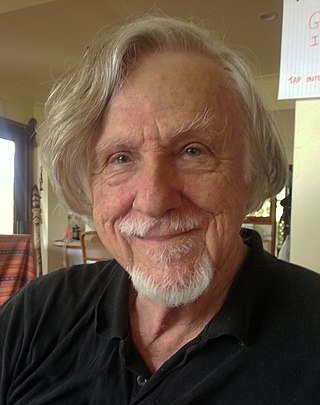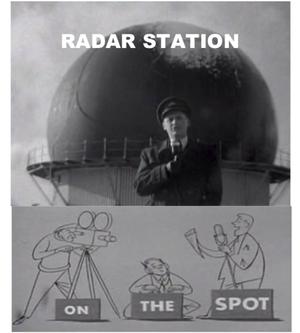
The National Film Board of Canada is Canada's public film and digital media producer and distributor. An agency of the Government of Canada, the NFB produces and distributes documentary films, animation, web documentaries, and alternative dramas. In total, the NFB has produced over 13,000 productions since its inception, which have won over 5,000 awards. The NFB reports to the Parliament of Canada through the Minister of Canadian Heritage. It has bilingual production programs and branches in English and French, including multicultural-related documentaries.

Sydney Cecil Newman was a Canadian film and television producer, who played a pioneering role in British television drama from the late 1950s to the late 1960s. After his return to Canada in 1970, Newman was appointed Acting Director of the Broadcast Programs Branch for the Canadian Radio and Television Commission (CRTC) and then head of the National Film Board of Canada (NFB). He also occupied senior positions at the Canadian Film Development Corporation and Canadian Broadcasting Corporation, and acted as an advisor to the Secretary of State.
The 1st Genie Awards were presented on March 20, 1980, and honoured films released in 1979.
Robin Spry was a Canadian film director, producer and writer. He was perhaps best known for his documentary films Action: The October Crisis of 1970 and Reaction: A Portrait of a Society in Crisis about Quebec's October Crisis. His 1970 film Prologue won the BAFTA Award for Best Documentary.
Donald Code Brittain, was a film director and producer with the National Film Board of Canada.

Michael Dattilo Rubbo is an Australian documentarian/filmmaker.
Don Owen was a Canadian film director, writer and producer who spent most of his career with the National Film Board of Canada (NFB). His films Nobody Waved Good-bye and The Ernie Game are regarded as two of the most significant English Canadian films of the 1960s.
Sugith Varughese is an Indian-born Canadian writer, director and actor.

Peter Raymont is a Canadian filmmaker and producer and the president of White Pine Pictures, an independent film, television and new media production company based in Toronto. Among his films are Shake Hands with the Devil: The Journey of Romeo Dallaire (2005), A Promise to the Dead: The Exile Journey of Ariel Dorfman (2007), The World Stopped Watching (2003) and The World Is Watching (1988). The 2011 feature documentary West Wind: The Vision of Tom Thomson and 2009's Genius Within: The Inner Life of Glenn Gould were co-directed with Michèle Hozer.https://www.imdb.com/name/nm0713394/
Canada Vignettes are a series of short films by the National Film Board of Canada (NFB), some of which aired on CBC Television and other Canadian broadcasters as interstitial programs. The vignettes became popular because of their cultural depiction of Canada, and because they represented its changing state, such as the vignette Faces which was made to represent the increasing cultural and ethnic diversity of Canada. The Log Driver's Waltz directed by John Weldon set to the recording of the song by Kate & Anna McGarrigle with, and as part of, The Mountain City Four is one of the most-requested items contained in the collection by the National Film Board of Canada. A similar series was later produced in the 1990s, however the name was changed to Heritage Minutes.
André Lamy was a Canadian film producer, who served as Canada's Government Film Commissioner from 1975 until 1979. In this position he was the Chairman of the National Film Board of Canada (NFB).

John Ross McLean (1905-1984), the 11th of 12 children of a Northern Manitoba minister and farmer, was born in the small prairie village of Ethelbert in 1905. He became a Canadian journalist and civil servant. In the latter role he served as the Commissioner of the National Film Board of Canada (NFB) in the 1940s, having previously been instrumental in the foundation of the Board the previous decade.
Canada's Story is a Canadian historical documentary television series which aired on CBC Television in 1966.
Pacificanada is a National Film Board of Canada (NFB) Canadian documentary television miniseries about British Columbia which aired on CBC Television in 1975.
Terence Macartney-Filgate was a British-Canadian film director who directed, wrote, produced or shot more than 100 films in a career spanning more than 50 years.

Albert Kish was a Canadian documentarian/filmmaker.

Radar Station is a 1953 Canadian short documentary film produced by the National Film Board of Canada (NFB) as part of the On The Spot series made specifically for television. The documentary involved an account of a visit to a radar station while it is involved in a simulated air attack, and is based on first-person interviews of the staff at the radar station.
The 29th Canadian Film Awards were held on September 21, 1978 to honour achievements in Canadian film. They were the last Canadian Film Awards ceremony to be held before the program was taken over by the Academy of Canadian Cinema and Television, and restructured into the new Genie Awards.
The 23rd Canadian Film Awards were held on October 1, 1971 to honour achievements in Canadian film. The ceremony, which had been returned to banquet format, was hosted by actor Leslie Nielsen and broadcaster Charlotte Gobeil.
The 18th Canadian Film Awards were held on May 6, 1966 to honour achievements in Canadian film.
This page is based on this
Wikipedia article Text is available under the
CC BY-SA 4.0 license; additional terms may apply.
Images, videos and audio are available under their respective licenses.






